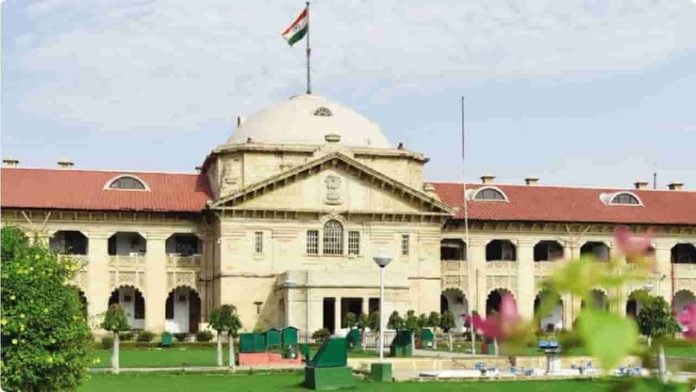The Allahabad High Court has recently said that it is paramount to look at the interests of a child in a custody case while deciding who should have custody. Based on this, the Court will decide in whose custody the child will be the most protected.
The Court has thus refused to hand over custody of the two-year-old daughter to the petitioner woman accused in her husband’s murder case. This order has been given by Justice J.J. Munir while dismissing the Habeas Corpus petition of Gyanmati Kushwaha of Mumbai.
The petitioner, Gyanmati Kushwaha, and the late Krishna Kushwaha, son of Suresh Kushwaha, were married, according to Hindu rites on November 11, 2011, at Shree Durga Bhavani Seva Mandal, Shivaji Nagar, B.M.C. Colony, Bandra East, Mumbai.
This marriage was according to the wishes of the husband and wife, and as it appears, did not have origins in the blessings of the couple’s families. Later on, Gyanmati Kushwaha and her late husband, Krishna Kushwaha, appear to have persuaded their respective families to bless the couple, which followed a marriage in right earnest being solemnized all over again on November 26, 2012.
There is a photostat copy of the invitation card relating to that marriage on record, which no one has disputed before the Court. In course of time, a daughter was born to the parties, who came to be named Drisha. She was born on May 28, 2017. It is about her custody that the mother and her grandfather, Suresh Kushwaha, are engaged in strife.
Gyanmati’s husband Krishna Kushwaha had come away to his native place at Jhansi on May 11, 2018, while Gyanmati stayed back in Mumbai.
She received a call from Kamal Kushwaha, her husband’s maternal uncle, on May 13, 2018, that some unknown offenders had done Krishna to death. Kamal Kushwaha asked Gyanmati Kushwaha to come over to Jhansi along with her daughter. She immediately proceeded to Jhansi with Drisha. Once there, she met Kamal Kushwaha. Kamal took along Gyanmati to the police station, where she was surprised to know that she had been implicated in her husband’s murder, as she says at the instance of Kamal, and was arrested.
Gyanmati Kushwaha was remanded to judicial custody on May 16, 2018, and at that time, Kamal snatched away Drisha from her. It is said that at that time, Drisha had not yet been weaned, but still, Gyanmati was deprived of her daughter’s care and custody while in jail. Gyanmati Kushwaha applied for bail and was released from prison on September 10, 2018.
After her release on bail, Gyanmati Kushwaha asked Kamal Kushwaha that she may be handed back her daughter’s custody, but he refused.
Gyanmati Kushwaha filed an application to the District Magistrate on August 21, 2019 under Section 97 of the Code of Criminal Procedure, 19731, with a case that her daughter was in illegal confinement of Kamal Kushwaha, and that the minor may be emancipated therefrom and handed back to her. No action was taken on this application.
Also Read: Supreme Court forms medical board to examine termination of 26-week pregnancy of 14-year-old
Mohini Jaiswal, counsel for the Petitioner, submitted that she is Drisha’s mother, and the only surviving natural guardian after her husband Krishna Kushwaha’s death. She is entitled to Drisha’s custody. It is submitted by Jaiswal on behalf of Gyanmati Kushwaha that the provisions of Section 6(a) of The Hindu Minority and Guardianship Act,1956 are of particular relevance.
She emphasized that under the proviso to Section 6(a), the mother has the right to the custody of a minor child until the age of five years ordinarily, which is quite apart from her right to the minor’s natural guardianship.
The Court assumes that the possibility of conviction may be remote or not so remote, but the possibility is there. The existence of this
possibility and the adverse impact of the event, if it were to come to pass, would far outweigh the transitory benefit the minor would derive from her mother’s care and company.
The fact of the matter apart, the possibility that the mother might truly be a conspirator in her husband’s murder, predicates a personality which would not be beneficial for the minor in
grooming her about her moral values – a very important aspect of a child’s welfare.
Also Read: Kerala HC sets aside family court order declaring marriage null and void
On the other hand, if the mother is innocent and she is acquitted, the loss, the minor would suffer on account of deprivation of her mother’s care and custody, cannot be re-compensated, but nevertheless, it is a reverse that must be accepted for the minor’s surer welfare, in preference to a contingent better, fraught with risk.
It is made clear that in the event the mother is acquitted by judgment based on doubt or otherwise, she would have the right to move a Court of competent jurisdiction for her daughter’s custody, which would then be decided in accordance with law.
The Court has refused to grant relief in view of the interest of the child.


